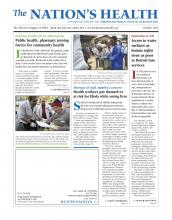Pregnant women with gestational diabetes are six times more likely to have children who develop diabetes or prediabetes, according to a recent study.
Published online in August in Diabetologia, the study underscores the need to educate women about the risks of gestational diabetes to their children’s health, said Aaron Caughey, MD, PhD, MPH, MPP, a member of the American College of Obstetricians and Gynecologists’ Committee on Obstetric Practice.
Pregnant women develop gestational diabetes when their blood sugar is too high and their bodies do not produce enough insulin to control blood glucose levels, according to the National Institute of Diabetes and Digestive and Kidney Diseases.
“We don’t really truly understand the implications on the next generation,” said Caughey, chair of the Department of Obstetrics and Gynecology and associate dean for Women’s Health Research and Policy, Oregon Health and Science University’s School of Medicine. “If you go back 100 years, there was really no such thing as adolescents getting Type 2 diabetes. It would’ve been unheard of. Whereas now, it’s relatively common and some of my patients — who are second-, third- time moms — their kids have diabetes at ages 13, 15.”
The study looked at 210 obese adolescents who were not exposed to gestational diabetes in the womb, and 45 who were. Of the adolescents who were not exposed, about 9 percent developed an impaired glucose tolerance or Type 2 diabetes, compared to about 31 percent of the adolescents who were exposed, the study said.
Controlling diabetes in the U.S. continues to be a challenge. Two out of every five Americans are expected to develop diabetes in their lifetimes, according to Centers for Disease Control and Prevention research published online in August in the The Lancet Diabetes and Endocrinology.
Caughey said health professionals can play a role in prevention by making pregnant women understand how their weight gain can affect their children, not just themselves. He added that it may be necessary for doctors to talk to women before they are thinking of pregnancy to stress how having a normal pregnancy weight will benefit their children, he said. Losing extra weight and increasing physical activity before pregnancy may help prevent developing gestational diabetes, according to the institute.
For more information, visit http://link.springer.com/article/10.1007/s00125-014-3345-2.
- Copyright The Nation’s Health, American Public Health Association









